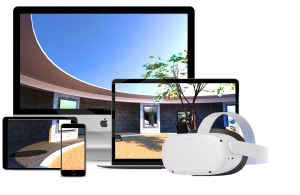Jump to:
Different roles within the same world
User roles
Roles are designed for seamless interaction within virtual spaces. Administrators shape the metaverse environment, content creators drive engagement, and participants navigate events effortlessly. Whether you're organizing, exploring, or attending, roles provide the perfect blend of access and responsibility for an immersive experience.
Roles can be defined for a virtual world or specified on a per space basis.
Author
Users with the Author role can create and manage properties (scenarios, spaces, and worlds) in Dashboard, which participants can then access.
Like Editors, Authors also have a crown👑 within the 3D environment, but they are not the same thing, as under a specific license there might be an infinite amount of Editors but only one Author. As this role is license-specific, it cannot currently be assigned within the Dashboard.
Editor 👑
An Editor is a user who has been given access to all functionality within the 3D environment. They have access to Edit mode, allowing free modification of the 3D environment, as well as managing its participants/attendees, sending announcements, answering Q&As, etc.
Editors can be thought of as “administrators” of the 3D environment, and are therein identified with a crown icon.
The creator of a space (i.e. its Author) is an Editor by default.
Presenter 💻
A Presenter is a user who has access to all functionality within the 3D environment, except for modifying the environment itself. They are marked with a computer icon.
VIP 🔷
A VIP has no special capabilities within the 3D environment, but they are marked by a blue diamond icon so as to differentiate them within the 3D environment. This is useful whenever a certain user or group of users needs to be marked but otherwise requires no special powers, e.g. support staff to help answer questions by attendees, reference people for a specific booth in an exhibition, and people of interest more in general such as honor guests.
Default role
In some parts of the interface a “Default” role might be mentioned, which indicates a normal user with no special powers or markings.
Role management
Roles are not platform-wide, but bound to a user in a specific space or world. The same user can therefore be a Presenter in one space, an editor in another, and a normal user in a third.
Assigning roles
Aside from Authors, who are automatically Editors within any space or world they have created, roles are through the invites interface on the Dashboard, accessible by clicking on the “more” menu of a space/world and then on “Invites”.
For a user that has not been invited yet, a role can be set by filling in the details in the interface (in red, below), selecting a role from the dropdown, and then clicking “Send”.
Roles cannot be assigned through bulk invites.
For users who have already been invited to the space, their assigned role can be changed by selecting the new one from the dropdown (in purple, above) and then clicking on “Change role”
A Default user role for all users accessing a space or world can be assigned through the settings of the property, specifically in the section:
- v 2.13+: Experimental settings
For instructions on how to change the version of a space/world see “How can I change the version of a space/world?” in the Known Issues & FAQ guide For instructions on how to change the settings of a space/world settings, see “Space settings > How do I change the settings of a space?” in the Known Issues & FAQ guide |
The setting can then be changed by selecting the role from the dropdown, then clicking “Save” at the bottom.
Default user role also applies to guest users entering the space or world.
It is not recommended to set Default user role to Presenter or Editor for groups larger than 15 participants. Presenter and Editor avatars are shown in full detail regardless of distance to all participants, too many avatars with these role can impact performance. |
Different roles within the same world
The role assigned to a user in a space will override the role assigned to the same user in the world.
Let’s make an example with a world with three spaces, to which user Ronnie is invited.
WorldXYZ: Ronnie is invited as a VIP
└ Space1: Ronnie has no invite for this space
└ Space2: Ronnie is invited as a Presenter
└ Space3: Ronnie is invited as a normal user (“Default” role)
The following will be true:
- Ronnie is able to access every space (including Space1) because he has been invited to the world as a whole
- Within Space1, Ronnie will be a VIP, having the role assigned from the World.
- Within Space2, the invite to the space will override the invite to the world, and Ronnie will be a Presenter
- Within Space3, the same rule applies and Ronnie will have the “Default” role.
In all cases, a role assigned through an invite will override the default role set in the space’s/world’s settings.

